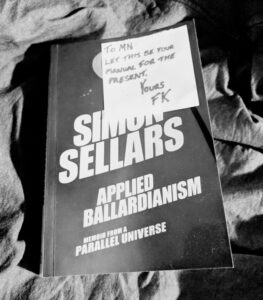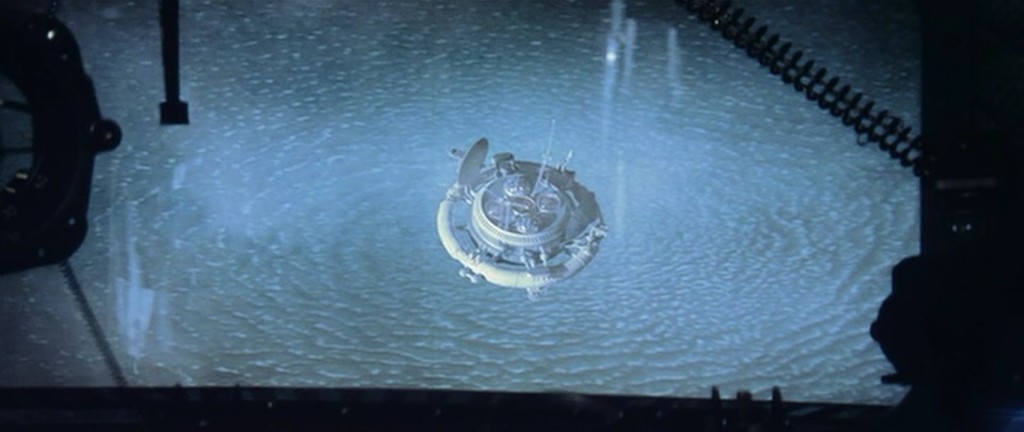
Four or five days ago – I don’t remember now – early in the morning around seven or eight I went to take the rubbish out and found to my surprise a small parcel outside my door, sitting beneath the porch. What was strange is that the postman doesn’t deliver until midday and the letter box was easily big enough for it to fit through, this was left for me. I quickly put it inside and proceeded to take out the trash. As the lid closed on the dustbin I turned back to upon the road, the streetlights were still on. They were covering the suburban brick walls in a thin fluorescent film. It all seemed a little dead.
I went inside and brewed myself an instant coffee. A taste I’ve come to somewhat ‘enjoy’, though I’m undecided as to whether or not I’ve simply reframed what ‘enjoy’ means. I picked up the package from near the door and sat at my kitchen table. The weather was dry and pale, the coffee was burnt and bitter and my eyes were heavy and already bored. I opened the package – a simple cardboard leaf type thing – to find a copy of Simon Sellar’s Applied Ballardianism: Memoir From a Parallel Universe. There was a post it attached to the inside of the package: To MN, let this be your manual for the present. Yours, FK.
My thoughts began to hum, I felt a little disjointed and so the digressions began. I knew not of Sellars – though my mind did quickly flash to the name Wilfred Sellars, alas no connection – , but ‘Ballardianism’, I understood this referred to the author J.G. Ballard. I’d read Crash when I was too young and most of it went over my head – however it did lead me to watch a documentary called My Car is My Lover. I had also seen Empire of the Sun and distinctly remember the scene which includes the joke:
“Hey kid! You want a Mars bar?”
“Yes please Mr!
“Me too kid!”
This takes place near some barbwire fence and the film stars a young Patrick Bateman and John Malkovich – who apparently plays Kurtz in another film, can you imagine.
I began to read Sellar’s book. It was strange. My mind began to make connections it had not made before. Absurd juxtapositions became clear to me. I became a little derealized but kept reading anyway. The book follows Sellars journey throughout the post-capitalist, heavily image driven landscape whilst he finds meaning within both his own life and the work of Ballard, and at times largely attempting to find meaning in his own life through Ballard. Sellars attends to many of my own personal ‘intellectual’ anxieties, largely his encyclopaedic knowledge of pop culture as a means of assessing and analysing almost any situation, event or text. As interesting as these analyses can be, Sellars brings to the fore the almost academic guilt one feels at being able to – in my own case – recite Mad Max almost word for word, but name at most 5 Rembrandt paintings. Is this Ballardian? I’m not too sure.
I began clawing at large clues as to what Ballardianism entailed. Dislocated, disenfranchised, derealized, disassociated and disconnected, everything Ballardian is unhinged and rides on a possibility. Sure, I don’t have a toaster that can play pornography, but the fact there almost certainly is one that can is rather Ballardian. Using the term ‘Ballardianism’ reeks of pomposity, and yet I feel that unlike Kafka-esque, Pynchonian, Foucauldian or Derridean the term Ballardian wouldn’t be taken as seriously at any literary convention, and yet also wouldn’t be taken seriously by those who are knee-deep in Ballard’s prophecies, namely the populous.
I left the book for now, I’d somehow read almost half of it by lunchtime, drinking only one insta-coffee as refreshment. I wondered what FK meant by the text being a manual. I was to find out. I showered and became aware of the intricacies of pressure and volume all whilst the latest album by Ghost BC played through my phone’s speaker. I was showering in any temperature of my choosing to the sound of occult Swedish pop. Odd. I finished up and made my way to the lounge, sat upon the sofa I felt a little dizzy, as if it had become very clear to me that all was merely representation, and at a moment’s notice the world could crumble. I flicked on the TV, something I hadn’t done in weeks, if not months. Ballard – and Sellars – are correct, videos of dying African children next to teeth whitening products, cinematic automobile adverts juxtaposed against school shootings. I didn’t give a shit about any of these things.
Ballardianism – as I’ve come to understand it – couldn’t truly exist without screens, TVs, monitors etc. And so I checked my phone for the 53rd time today, nothing. I flicked through my 3 personally recurrent apps: Twitter, Reddit and Snapchat. The first two are somewhat self-explanatory in that they’re social media and easy pickings, but the last, Snapchat, is a Ballardian oasis. It is where the average consumer goes to signal purchase, life and desire. 5 second clips of gatherings, meals, holidays, beers, consumption, fireworks, flash cars. Temporary images of kisses, meals, friends, speed-limits, law-breaking and of other screens; temporary images of consumption fractured and fragmented from their successive reality. A snippet of the most mind-numbingly basic desire uploaded into cyberspace and paraded in front of information perverts. My deconstructions made me feel nauseous, I needed real air.
I began the short walk to town. On the way I saw the corpse of a shrew nestled in a discarded kitkat wrapper. I listened as the faint tweets of the distant birds were drowned out by competitive revving, inaudible bass and the occasional soap-opera tune emanating from a passing window. The odd mixture of manure and cherry vape smoke made my nose overreact, it began to drip. I used a Simpsons tissue from the bottom of my rucksack to wipe it, Marge’s face began to bleed ink. I became self-conscious of the lint stuck to my chinos and took the indirect route via the churchyard because of this. I looked up the spire, the bells already clanging, the light shone through the stained glass window upon the automated bell-ringing mechanisms. I thought about Jesus on the cross…I thought about robo-Jesus on his robo-cross. Just past the spire are small burial plaques, I always look out for my Grandparent’s one, subtly covered in overgrown grass, next to it a 1ft high ornament of Sleepy from the Seven Dwarves holding a wheelbarrow and yawning. I left the churchyard.
The book had got to me quite quickly. Its clean prose and meticulous attention for visual connections and juxtapositions had quasi-upgraded my software. I was temporarily a machine of consumerist deconstruction, allowing each desire, attitude and signal to rise to the surface. Breath in Sellar’s work and let the cores of the consumo-apathetic landscape shine brightly next to one another. A toolkit for ideological assimilation preparation, watch as the the edges blur, the borders fade and desire willingly sodomizes acceptance.
I finally made it to the store. I can’t detail what I saw because it would only turn into an incoherent scribble of absurd post-capitalist connections. The emergence of a simple local convenience store creates such dislocated, fragmented and visually hostile connections that one’s only course is to submit. I thought back to Sellars book, and the note left for me. Perhaps it is a manual for the present. But the present is incoherent. And so Sellar’s book is but a manual for a maze into visual absurdity, into post-capital hyper-hedonia; a guidebook for a present at the whim of unhinged infantile desire, a present being dragged from the asylum of time and gaffer-taped to Ballardian intensities.
Read More



